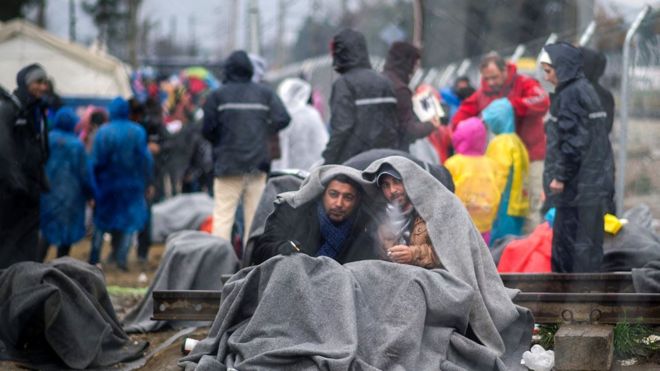Migrant crisis: EU meeting seeks to heal growing rift
 copyright AFP/Getty
copyright AFP/Getty
Ministers from EU and Balkan nations are meeting in Brussels to try to heal rifts over migrants that have plunged common policy into chaos.
Austria, Serbia and Macedonia have taken their own steps to limit entry to migrants, angering Greece, which fears the controls will cause a bottleneck.
A surge in migration, and the failure to agree an EU-wide response, have led to warnings about the bloc's survival.
More than 100,000 migrants have reached Europe this year, most via the Balkans.
European Council president Donald Tusk has warned that the failure to make progress towards resolving the crisis could increase the likelihood of the UK voting to leave the EU this year.
The EU interior ministers meeting in Brussels will hear plans drawn up by Austria and eight Balkan countries that seek to restrict the numbers entering their borders.
An official from the current Dutch presidency of the EU told the AFP news agency that the purpose of Thursday's meetings would be "to allow us to avoid surprises - we have to avoid that one country is surprised by the measures taken by another."
In separate developments:
The countries have also pledged to accept only those they deem to be in need of protection, which has already been interpreted by some governments as meaning only Syrians and Iraqis.
Macedonia enacted the measures at its border with Greece over the weekend, barring entry to Afghans, who make up many of the migrants.
Austrian Interior Minister Johanna Mikl-Leitner described the measures as a "chain reaction of reason" and warned that the crisis could threaten the EU's survival if it was not brought under control.
Sebastian Kurz, the Austrian foreign minister told German TV that Europe had to "abandon this goal of allowing in unlimited numbers".
"We in Austria are overwhelmed," he said. "It cannot be that all migrants make their applications for asylum in Western Europe."
Analysis -
The air is thick with recrimination as ministers meet to try to save a common migration policy that is threatening to collapse in disarray. The situation is bad, said one senior diplomat, and getting worse.A number of countries have followed Austria's example in imposing unilateral border measures to try to restrict the flow of migrants and refugees seeking asylum. Other countries want to shift the focus back onto common solutions, such as sharing the burden of hosting arriving refugees more widely.
But the plans drew sharp criticism from Greece, which threatened to block all decisions at EU migration summits next month if member states did not agree to take in quotas of migrants.
Greek Prime Minister Alexis Tsipras said his country was turning into a "permanent warehouse of souls" and should not be left to deal with the crisis alone.
"From now on, Greece will not agree to deals if we do not secure the mandatory sharing of the burden and responsibility proportionally among member states," Mr Tsipras said.
The UN refugee agency, UNHCR, has also criticised the measures. "The response is not closures, it is co-operation," said the agency's head, Filippo Grandi. "Everybody has to take a share of this burden."
Last September, EU ministers agreed plans to relocate 120,000 migrants from Italy, Greece and Hungary to other EU countries. But the majority vote decision was opposed by Romania, the Czech Republic, Slovakia and Hungary.
On Wednesday Hungary announced it would hold a referendum on accepting mandatory EU migrant quotas. Hungarian Prime Minister Viktor Orban stressed that the quotas "could redraw Europe's cultural and religious identity".
In an interview with German newspaper Bild, he said Europe was paying Turkey to secure its borders as it could not protect them itself.
"This policy makes Europe's future and security reliant on the goodwill of Turkey," he warned.
The referendum is expected to be held in the autumn, subject to parliamentary approval.
More than 100,000 migrants have arrived in Greece and Italy so far this year.
More than 400 migrants died attempting to make the journey during the same period, the IOM said.
credit bbc.co.uk
No comments:
Post a Comment